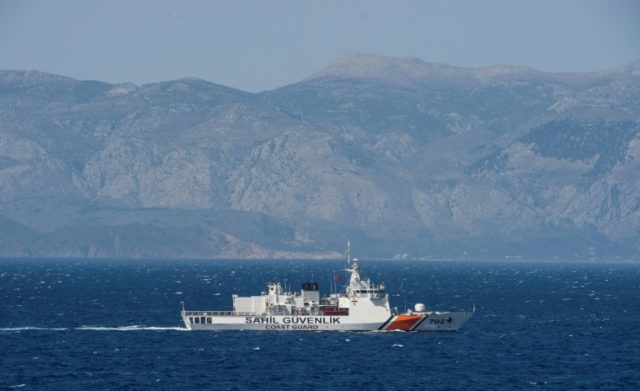Istanbul (AFP) – Turkey is once again facing off against historic foe-turned-ally Greece in one of their fiercest rows in years, though the war of words is unlikely to spill over into military confrontation.
With some two months before Turks vote on a critical referendum to enhance presidential powers, this renewed dispute is fuelling nationalistic sentiment inside Turkey.
Forging a less ideological and more pragmatic relationship with Athens has been seen as one of the major foreign policy gains of Turkish President Recep Tayyip Erdogan’s ruling party since it came to power in 2002.
But tensions over disputed Greek islets in the Aegean Sea, airspace violations and discord on how to handle Byzantine heritage inside Turkey have cracked open an old schism between the two NATO allies.
The refusal in January of a Greek court to extradite eight former Turkish army officers over the failed July 15 coup widened that chasm.
The eight fled to Greece by military helicopter on the night of the putsch, which Turkey says was masterminded by the US-based Islamic preacher Fethullah Gulen.
Defence Minister Fikri Isik slammed the Greek court’s decision as a “complete disappointment”.
“Any decision taken by Turkey’s partners in relation to the failed coup is bound to be highly controversial, be it Gulen’s extradition from the US or the officers’ extradition from Greece,” said Marc Pierini, visiting scholar at Carnegie Europe.
– ‘Unwanted situation’ –
In an apparent riposte, a Turkish naval vessel with Chief of Staff General Hulusi Akar onboard conducted a sail-by of two disputed islets in the Aegean on January 29, prompting Greece to shadow the Turkish boats with its own forces.
The uninhabited islets — known collectively as Kardak in Turkish and Imia in Greek — have long been a source of tension.
A row over their sovereignty flared in January 1996, when the two countries sent marines to two neighbouring islands in a sign of an imminent armed confrontation.
They withdrew their troops after heavy diplomatic pressure from the United States, a fellow NATO member.
Greek Defence Minister Panos Kammenos later flew over the islets in a helicopter, throwing a wreath into the water to commemorate three Greek soldiers killed in a helicopter crash in the 1996 dispute.
Turkish Foreign Minister Mevlut Cavusoglu warned that “if the situation escalates — God forbid, if an unwanted situation happens — it would be irreparable”.
Prime Minister Binali Yildirim accused Kammenos of posturing, arguing that there were “130 large and small rocks” in the Aegean whose status is disputed.
But Greek Prime Minister Alexis Tsipras warned Ankara its actions “would lead nowhere”, insisting there were no “grey areas” of territory in the Aegean and that Turkey had simply violated Greek waters.
– ‘Too many risks’ –
Greek Foreign Minister Nikos Kotzias blamed the tensions on Turkish domestic politics.
“Many aspects of foreign policy have not gone as they wanted and they have big internal problems,” he told Alpha Radio.
Dimitrios Triantaphyllou, director for the Centre for International and European Studies at Kadir Has University in Istanbul, said Turkey and Greece have never formalised their partnership beyond political dialogue and hopes to boost trade.
“Without a viable legal and political framework embedding the relations… the maintenance of the status quo holds far too many risks,” he said.
He argued that the standoff was being used by Turkey to show that “if it wants, it can bite” in the extradition row, at a time of political turbulence at home.
Nationalist rhetoric traditionally escalates in Turkey ahead of elections and Turks are expected to vote in April in a potentially tight referendum on giving Erdogan extra powers.
– ‘No interest in escalation’ –
Greece and Turkey joined NATO simultaneously in 1952 as postwar Europe and the United States worked to ensure they never again went to war.
But the relationship remained explosive, not least when Turkish paratroopers invaded Cyprus in 1974 in response to an Athens-inspired coup seeking union with Greece.
But those tensions were set aside with the so-called earthquake diplomacy of 1999 — where Greece responded quickly to a devastating earthquake in Turkey.
Turkey then turned around and helped its neighbour when a deadly quake hit Athens a month later.
The ascent to power of the Islamic-rooted government of Erdogan, who sought to distance Turkey from the vigorous secular nationalism of past administrations, further helped.
The relationship is of far more than just bilateral importance and Turkish officials have already indicated this new row could hurt a deal with the EU to cut the flow of migrants.
The two sides are also working together to end the division of Cyprus. The UN’s Cyprus envoy Espen Barth Eide admitted the tensions were something “I’d rather be without”.
Yet both sides also emphasised they want to keep relations alive, with Kotzias expressing hope they can “soften the tone”.
“I do not think that any side has an interest in further escalation,” said Ioannis Grigoriadis, assistant professor at Ankara’s Bilkent University.
He predicted the dispute will “once again go on the back burner”.

COMMENTS
Please let us know if you're having issues with commenting.